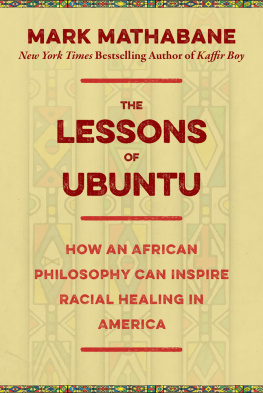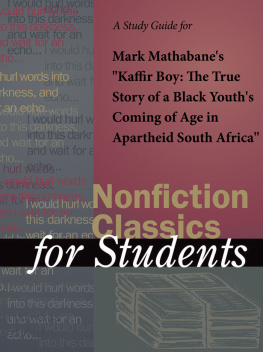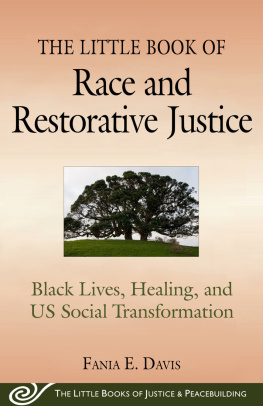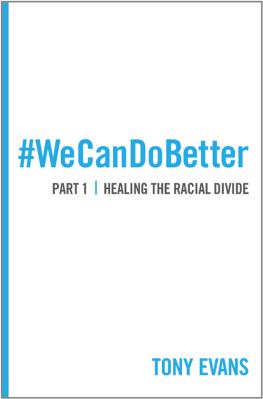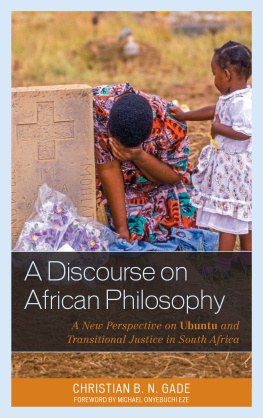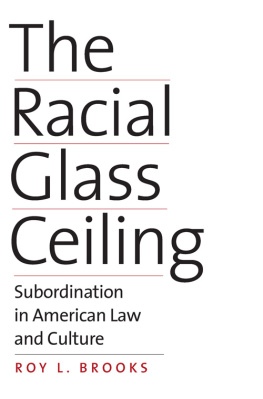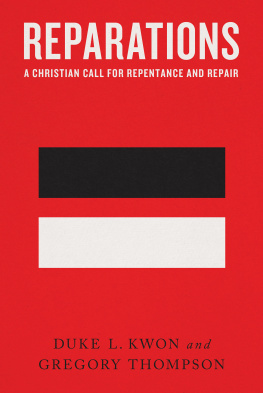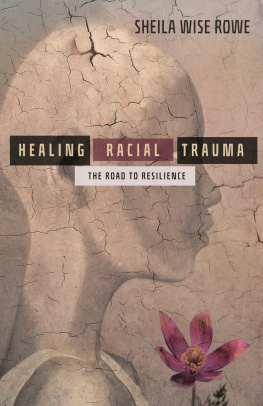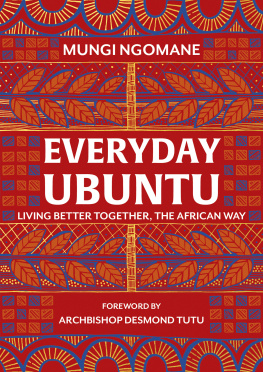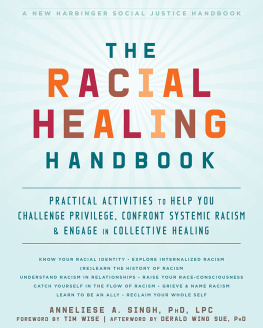
Copyright 2018 by Mark Mathabane
All rights reserved. No part of this book may be reproduced in any manner without the express written consent of the publisher, except in the case of brief excerpts in critical reviews or articles. All inquiries should be addressed to Skyhorse Publishing, 307 West 36th Street, 11th Floor, New York, NY 10018.
Skyhorse Publishing books may be purchased in bulk at special discounts for sales promotion, corporate gifts, fund-raising, or educational purposes. Special editions can also be created to specifications. For details, contact the Special Sales Department, Skyhorse Publishing, 307 West 36th Street, 11th Floor, New York, NY 10018 or .
Skyhorse and Skyhorse Publishing are registered trademarks of Skyhorse Publishing, Inc., a Delaware corporation.
Visit our website at www.skyhorsepublishing.com.
10 9 8 7 6 5 4 3 2 1
Library of Congress Cataloging-in-Publication Data is available on file.
Cover design by Rain Saukas
Print ISBN: 978-1-5107-1261-4
Ebook ISBN: 978-1-5107-1262-1
Printed in the United States of America
I n celebration of the one hundredth anniversary of President Nelson Mandela of South Africa, who showed the world that having the courage to speak the language of Ubuntu can save a nation from the flames of a race war, and who, in his biography, Long Walk to Freedom , described my hometown of Alexandra, where he once lived in a small dilapidated house, as having a special place in his heart for making him aware of the bitter fruits of racial injustice, I dedicate this book to the following: First, to my three children, Bianca, Nathan, and Stanley. Their ability to naturally and proudly speak Ubuntu, the language of our common humanity, as part of the millennial generation that elected Barack Obama as Americas first black president, taught me a lot about the urgent need for racial healing in the United States. Second, to all those Americans and South Africans, black and white, who over the years helped me identify the obstacles to speaking the language of Ubuntu as well as the ten principles for overcoming them. It is these individuals, chief among them my mother, whose deeds convinced me that the language of Ubuntu is ultimately the key to human survival in this besieged hut we call Planet Earth. A special dedication to the late Miss Tanye Washington, principal of Parkdale High School in Maryland, for providing exemplary and empathetic leadership, which inspires marginalized students from over 160 countries to learn to speak the language of Ubuntu as part of Americas future leaders and global citizens.
Contents
Preface
Learning the Language and Lessons of Ubuntu
S ince Trumps stunning victory in 2016, polls have consistently revealed the astonishing fact that most Americans believe that their president is a racist. The results of a GenForward poll conducted almost a year into Trumps presidency, when one would have expected an improvement in this dismaying perception, also found that 63 percent of millennials, the countrys future, believe he is a racist. How did we get to such a low point as a nation, especially after President Obamas visionary and empathetic leadership? Most importantly, how do we extricate ourselves, repair the enormous damage Trumps divisive campaign, and presidency, have done to race relations and begin to heal? This book addresses these salient questions, on which Americas future as a nation united, with justice and prosperity for all, hinges. A signal symptom of this divide, and its dangers, occurred on August 13, 2015 in Charlottesville, Virginia, when a torchlight parade by members of neo-Nazi and KKK groups, in an eerie scene reminiscent of the early days of Nazi Germany, chanted, Blood and soil, Jews will not replace us, and These streets are ours. Jews will not replace us, and These streets are ours. The following day, a white supremacist rammed a Dodge Challenger into a crowd protesting the white nationalists rally, killing Heather Heyer, an activist described by friends as a sweet soul who often stood up against injustice. After Trumps stunning victory, white supremacist groups held a celebratory meeting to outline their agenda in the very shadow of the White House, where Nazi-like salutes were flaunted. White supremacists see in Trump a president who tacitly supports their cause, especially when he blamed both sides for the Charlottesville riot, vilified Hispanics as murderers and rapists, and demonized Muslims and Islam for crimes of a few. They also see White House Chief of Staff John Kelly as advocating white supremacy when he said that compromise could have averted the Civil warin other words, the North should have allowed the South, which threatened to break up the union by declaring war in order to perpetuate slavery, to make some improvements of that evil institution by, perhaps, giving slaves time off on weekends or more rations, for good behavior.
Trump is President, thats a factand barring his impeachment and removalhe will remain in office till 2020. Its also a fact that race relations are in tatters. The question thenand in many ways its an existential one for Americais how can a nation with a history of slavery, segregation, and Jim Crow, a nation which has become so divided and balkanized that blacks and whites might as well be inhabitants of different planets instead of fellow citizens, heal under a president who is adored by white supremacists and reviled by millions of Americans for waging one of the most blatantly racist campaigns ever? The answer to this momentous question is the central thesis of my book. The task for racial healing couldnt be more dauntingand urgent. Following charges that Trumps electoral success had been fueled by unadulterated racism, xenophobia, Islamophobia, anti-Semitism, homophobia, and misogyny, and by Trumps appeals to the fears and insecurities of voters, thousands of protesters took to the streets in cities across America. Some burned Trumps image in effigy. Others compared him to Hitler, while many called his election a fraud (Trump handily defeated Hillary Clinton in the Electoral College but lost the popular vote by three million) and denounced him with slogans such as Hes not my president and Love trumps hate. Additionally, several Trump supporters were beaten by protesters.
Among Trumps supporters, former Ku Klux Klan grand wizard David Duke rejoiced. This is the greatest night of my life, Duke crowed, despite having just lost a bid to become one of Louisianas representatives in the US Senate. Make no mistake, our people have played a huge role in electing Trump.
I couldnt help wondering what Duke meant by our people.
Did these people include those who, after Trumps election, ignited the violence in Charlottesville which led to Heather Heyers death; launched a wave of terror that desecrated Jewish cemeteries; made bomb threats against synagogues, Jewish schools, day care centers, and other Jewish institutions; threatened Hispanics; attacked Muslims, Indians, and Sikhs; and carried out a rash of antiblack racist acts in cities and communities across America? At a high school in Minnesota the following messages were scrawled on bathroom walls, mirrors, and doors: Go back to Africa, Whites Only, and Black lives dont matter. In Wellsville, New York, a giant swastika on a park wall read Make America White Again. In the Seattle suburb of Kent, Washington, Deep Rai, a Sikh, was working on his car in his driveway when a man approached him and told him to go back to your own country. At several Texas universities flyers were distributed anonymously that equated the promotion of diversity and multiculturalism with white genocide and hailed Trump as the savior of the white race. At Gwinnett County High School in Georgia, several buildings and sidewalks along with the schools stadium were defaced with graffiti filled with racist language, swastikas, and mentions of the KKK and Donald Trump.
Next page
